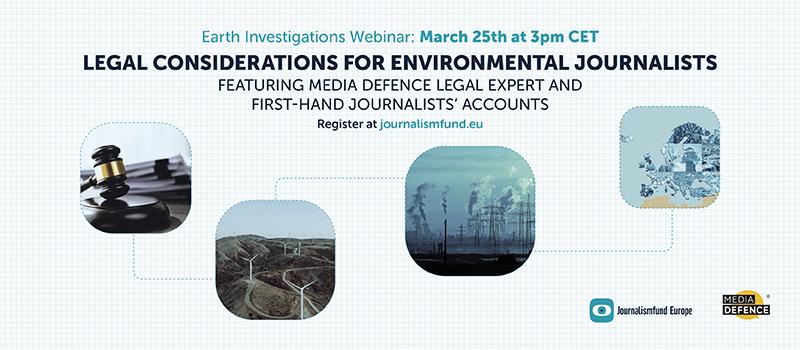Environmental journalists are at the forefront of holding states and private actors to account for practices that harm the planet. Yet, this essential work often comes with significant risks. How to mitigate them?
Over the past 15 years, at least 749 journalists have been attacked, and 44 killed, for reporting on environmental issues—making it one of the most dangerous beats globally, second only to war reporting. Countless others have suffered online violence, surveillance, harassment, intimidation, cyberattacks and SLAPP lawsuits.
To address these challenges, Journalismfund Europe organised a conversation with Sabah A. Sabah is a qualified solicitor with over a decade of legal experience, specialising in media defence and human rights law. She had joined Media Defence in 2018 and has worked across a broad range of freedom of expression cases, with a particular focus on SLAPPs, defamation, internet shutdowns, and spyware. Prior to this, she had practised in criminal defence, extradition, and civil litigation, advocating in UK courts on high-profile human rights and public law matters.
Media Defence is an international human rights organisation which has been providing legal advice to independent journalists under threat since 2008. It is the sole organisation entirely dedicated to this cause, and works in 117 countries. So far it has supported over 1,500 press freedom cases, and the number of cases per year keeps growing.
Key topics which were discussed in this webinar:
- SLAPPs, Defamation, and Beyond: Explore the evolving tactics used to silence journalists, particularly in Europe. While defamation claims have long been a tool of intimidation, new charges are emerging, including economic offenses and data protection violations. Gain insights into the legal challenges faced by journalists covering environmental protests.
- Case studies and first-hand experiences of environmental journalists facing legal threats. Criminal Charges and Extradition: Hear about key legal cases and the risks faced by journalists in different jurisdictions.
- Media Defence’s Support Framework: Learn how Media Defence offers essential legal support, connecting journalists with a global network of lawyers, providing emergency financial support for legal cases, and pursuing strategic litigation to safeguard press freedom and challenge impunity for crimes against environmental journalists.
In addition to insights from Sabah A., two journalists will share their experiences, Barış Altıntaş and Maciek Piasecki.
- Barış Altıntaş is an Istanbul-based journalist. She is a co-founder and currently co-Director of the Media and Law Studies Association (MLSA), which offers legal assistance to journalists in peril and professional support to journalists out of jobs. She is also a founding board member of the Balkan Network of Science Journalists (BNSJ). Early in her career, she worked for various news agencies and newspapers such as the Economic News Agency (EBA) and Turkish Daily News, reporting on politics and science. Later, she transitioned to freelance journalism, contributing to outlets like Tageszeitung and Index on Censorship, focusing on press freedom and politics. Between 2016 and 2018, she served as a justice reporter for various media outlets. She will discuss growing risks for environmental journalists in Turkey, including legal harassment, SLAPPs, and police brutality, and share real court cases where reporters have been prosecuted for their coverage.
- Maciek Piaseck is a Polish journalist specialising in environmental reporting and covering climate protests in Poland and across Europe. His footage has provided evidence in numerous cases where activists were falsely accused by the police. In July of last year, he was forcibly removed and detained while covering a climate protest in Warsaw. He has also faced fines from the police, aiming to delegitimise and undermine his reporting. Maciek will share his experiences with legal challenges as an environmental journalist, discuss the broader context for such journalism in Poland and Europe, and offer practical advice for journalists on navigating legal threats, protecting their work, and enhancing field security.
As smuch as we celebrate being able to help a greater number of journalists and media outlets, we cannot ignore the fact that journalism is facing more legal threats than ever before.
Carlos Gaio, Media Defence CEO
